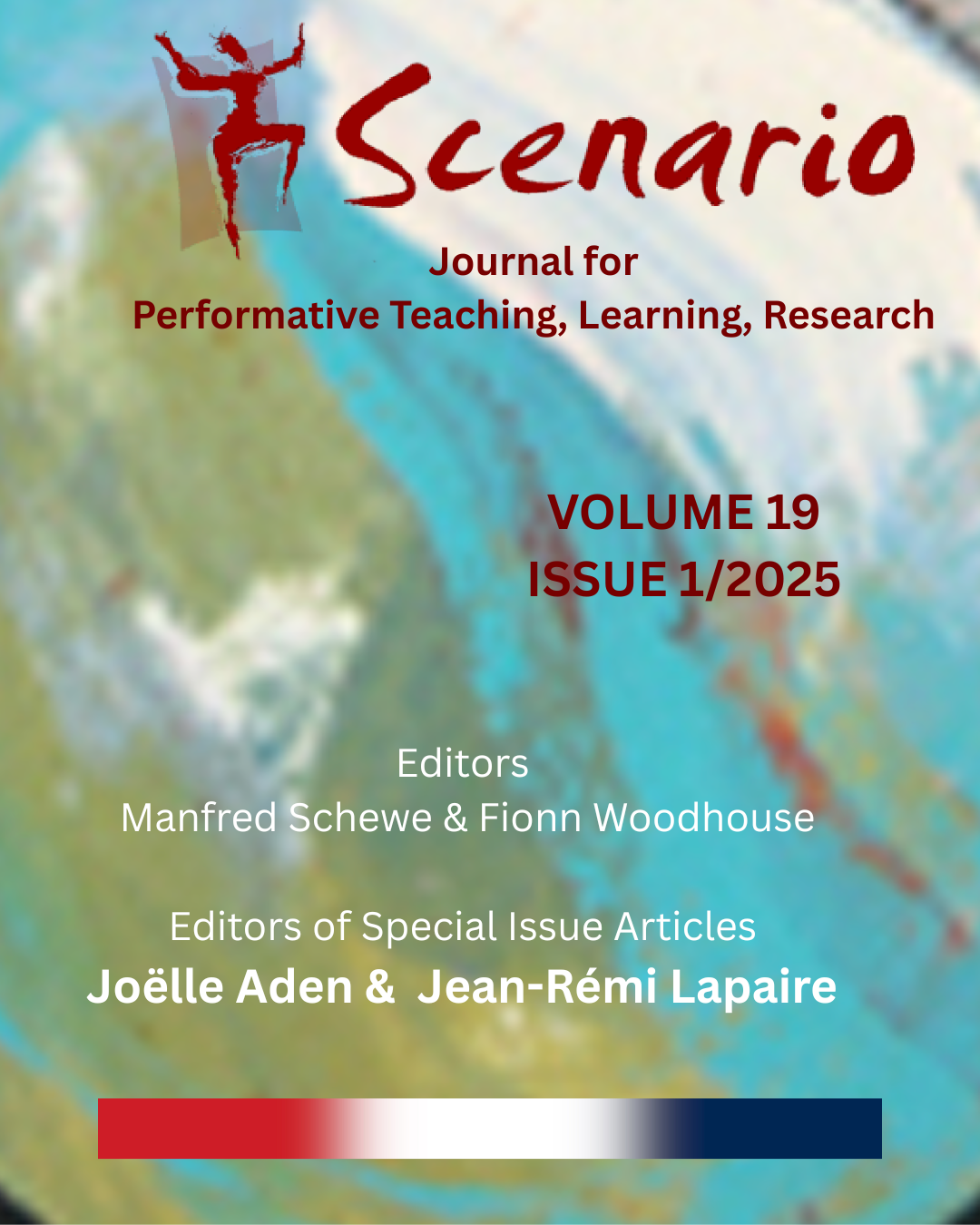Le tandem dans un atelier de théâtre au service d’une meilleure prononciation et d’une acceptation de soi en LVE
DOI:
https://doi.org/10.33178/scenario.19.1.7Keywords:
tandem, relational ecology, French as a second language, phonetics, community theatre, joint experience, EnactionAbstract
This article presents a peer tutoring initiative developed within a community theatre workshop; part of a practice-based research project supported by the DRAC of the Pays de la Loire region. The program pairs young French-speaking participants with allophone learners. The francophone tutors support their peers in learning French as a second language (FSL) through theatrical exercises. The study focuses on one specific pair working on improving the pronunciation and intelligibility of a Ukrainian-speaking student.
Multimodal analysis of their interactions shows that the workshop goes beyond linguistic goals. It becomes a relational and affective space, echoing Grotowski’s (1971) vision of theatre as a “shared birth” and the “complete acceptance of one human being by another.” Anchored in the enactive paradigm (Varela, 1999), this research sees theatre not just as a tool for language acquisition, but as a “joint experience” (Aden, 2013) that embodies an “ethical know-how” (Varela, 1992). We hypothesize that the relational ecology created in such a theatrical context supports the learning of pronunciation prior to more technical corrective phonetics approaches (Nocaudie, Alazard-Guiu, Billières, 2019), ultimately enhancing the communicative abilities of young allophone learners.
References
Aden, J. (2013). De la langue en mouvement à la parole vivante. Théâtre et didactique des langues. Langages, 192 (4), 101–110. https://doi.org/10.3917/lang.192.0101
Aden, J., Clark S. et Potapushkina-Delfosse M.(2019), « Éveiller le corps sensible pour entrer dans l’oralité des langues : une approche énactive de l’enseignement de l’oral », Lidil [En ligne], 59 https://doi.org/10.4000/lidil.6047
Billières, M. (2019). Phonétique corrective à Padoue : un été fécond ! Blog Au son du FLE. https://www.verbotonale-phonetique.com/phonetique-fle-ete-fecond
Dufeu, B. (n.d.). L'importance de la prononciation dans l'apprentissage d'une langue étrangère. Franc-Parler, FIPF. https://bop.fipf.org/wp-content/images/stories/dossiers/phonetique_dufeu3.htm
Ekman, P., & Friesen, W. V. (1969). The repertoire of nonverbal behavior: Categories, origins, usage, and coding. Semiotica, 1(1), 49-98.https://doi.org/10.1515/semi.1969.1.1.49
Forest, D. (2006). Analyse proxémique d'interactions didactiques. Carrefours de l'éducation, 21(1), 73-94. https://doi.org/10.3917/cdle.021.0073
Grotowski, J. (1971). Vers un théâtre pauvre (Collection Théâtre vivant). Éditions d'Age d'homme / La Cité.
Lapaire J.-R. Grammaire de l’oral et engagement du corps apprenant. Martinot, Claire et Pégaz Paquet, Anne (eds.). Innovations didactiques en français langue étrangère, La Cellule de Recherche en Linguistique (CRL), pp.25-37, 2014, ISBN 2-9526027-5-1
McNeill, D. (1992). Hand and mind: What gestures reveal about thought. University of Chicago Press.
Mondada, L. (2018). Multiple temporalities of language and body in interaction: Challenges for transcribing multimodality. Language and Dialogue, 8(1), 1-23. https://doi.org/10.1075/ld.6.1.01mon
Nocaudie, O., Alazard-Guiu, C., & Billières, M. (2019). Oral d'aujourd'hui, oralité de demain : et la phonétique corrective dans tout cela ? Recherches en didactique des langues et des cultures. [DOI non disponible].https://doi.org/10.4000/rdlc.4615
Paquin, L.-C. et Noury, C. (2018). Définir la recherche-création ou cartographier ses pratiques ?. Découvrir magazine, ACFAS. https://www.acfas.ca/publications/decouvrir/2018/02/definir-recherche-creation-cartographierses-pratiques
Varela, F. (1996). Ethique et action. Le savoir-faire éthique : un défi à la philosophie contemporaine. In F. Varela, P. J. Hamelet, & J.-P. Dupuy (Eds.), L'éthique et l'action (pp. 19-44). Le Seuil.
Downloads
Published
Issue
Section
License
Copyright (c) 2025 Maria Pavlovskaya

This work is licensed under a Creative Commons Attribution-NonCommercial 4.0 International License.







